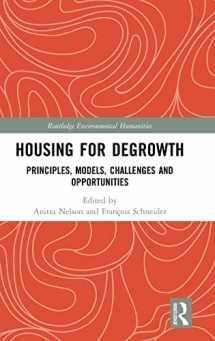
Housing for Degrowth: Principles, Models, Challenges and Opportunities (Routledge Environmental Humanities)
ISBN-13:
9781138558052
ISBN-10:
1138558052
Edition:
1
Author:
Anitra Nelson, François Schneider
Publication date:
2018
Publisher:
Routledge
Format:
Hardcover
296 pages
FREE US shipping
Book details
ISBN-13:
9781138558052
ISBN-10:
1138558052
Edition:
1
Author:
Anitra Nelson, François Schneider
Publication date:
2018
Publisher:
Routledge
Format:
Hardcover
296 pages
Summary
Housing for Degrowth: Principles, Models, Challenges and Opportunities (Routledge Environmental Humanities) (ISBN-13: 9781138558052 and ISBN-10: 1138558052), written by authors
Anitra Nelson, François Schneider, was published by Routledge in 2018.
With an overall rating of 3.5 stars, it's a notable title among other
books. You can easily purchase or rent Housing for Degrowth: Principles, Models, Challenges and Opportunities (Routledge Environmental Humanities) (Hardcover) from BooksRun,
along with many other new and used
books
and textbooks.
And, if you're looking to sell your copy, our current buyback offer is $0.3.
Description
‘Degrowth’, a type of ‘postgrowth’, is becoming a strong political, practical and cultural movement for downscaling and transforming societies beyond capitalist growth and non-capitalist productivism to achieve global sustainability and satisfy everyone’s basic needs. This groundbreaking collection on housing for degrowth addresses key challenges of unaffordable, unsustainable and anti-social housing today, including going beyond struggles for a 'right to the city' to a 'right to metabolism', advocating refurbishment versus demolition, and revealing controversies within the degrowth movement on urbanisation, decentralisation and open localism. International case studies show how housing for degrowth is based on sufficiency and conviviality, living a ‘one planet lifestyle’ with a common ecological footprint. This book explores environmental, cultural and economic housing and planning issues from interdisciplinary perspectives such as urbanism, ecological economics, environmental justice, housing studies and policy, planning studies and policy, sustainability studies, political ecology, social change and degrowth. It will appeal to students and scholars across a wide range of disciplines.


We would LOVE it if you could help us and other readers by reviewing the book
Book review

Congratulations! We have received your book review.
{user}
{createdAt}
by {truncated_author}


